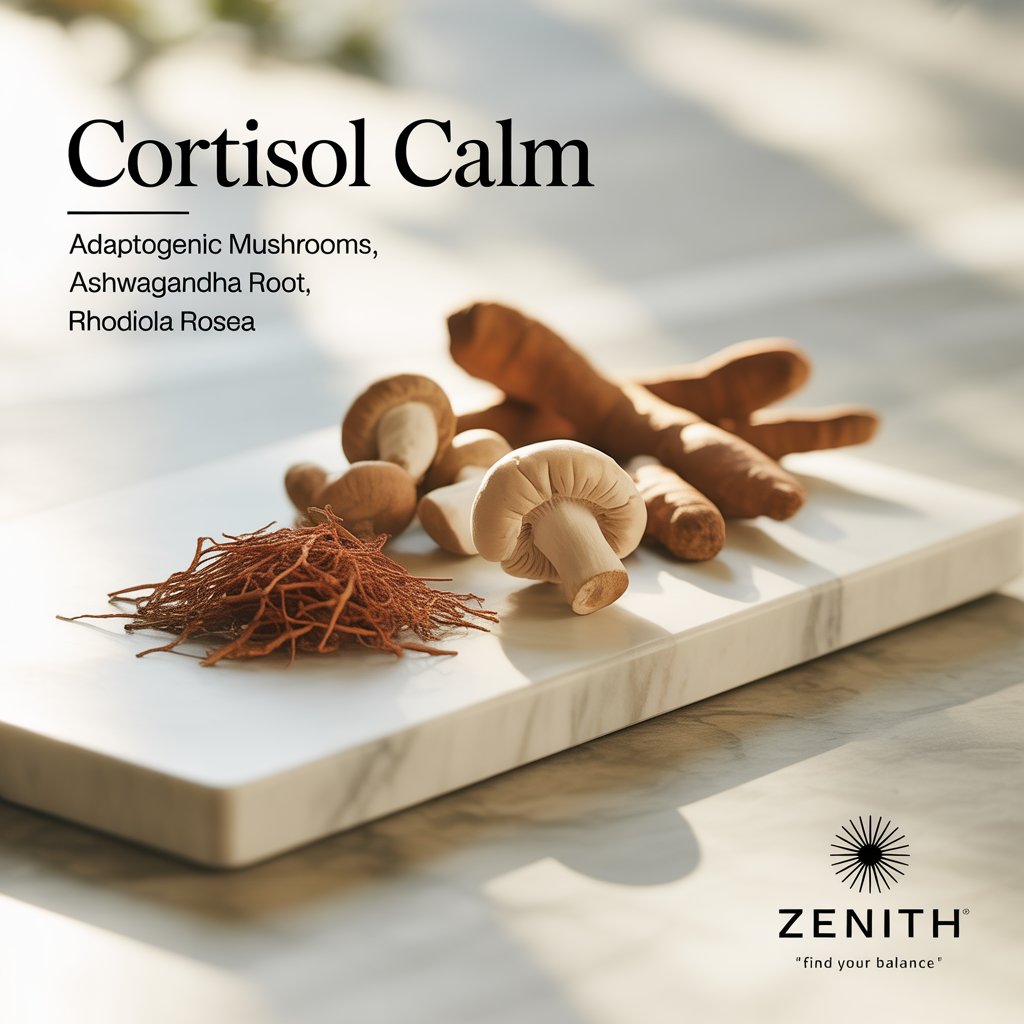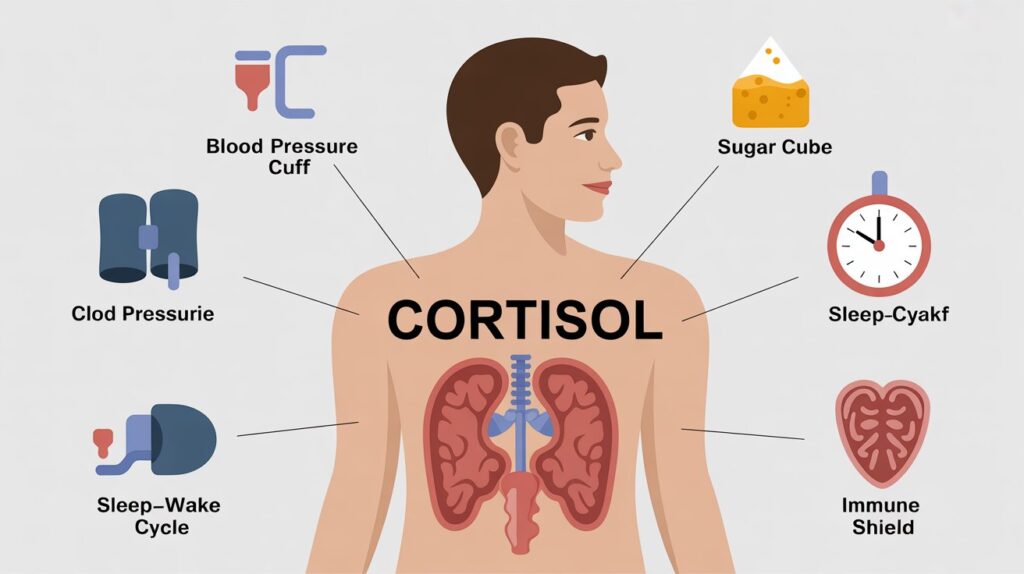Introduction: Sipping on a Social Media Sensation
A new beverage has captured widespread attention across social media platforms, particularly TikTok, where it has rapidly gained viral status. Known as the “cortisol cocktail,” this drink is being widely shared through countless user testimonials, personal experiences, and recipes, all touting its supposed health benefits.1 Proponents of this trendy concoction claim it offers a natural and simple approach to balancing the body’s cortisol levels, significantly reducing stress, and even aiding in weight loss, particularly around the abdominal area. Many users also report a noticeable boost in energy after consuming the drink.1 The appeal of this cocktail lies in its presentation as an accessible, natural solution to common yet complex health concerns.
The rapid spread of the “cortisol cocktail” on TikTok is more than just a passing fad; it highlights a significant public desire for quick, accessible, and often “natural” remedies for widespread health issues such as stress and weight management. This phenomenon suggests a potential gap in how accessible, trustworthy, and engaging public health information is currently delivered. Individuals are increasingly turning to unverified social media trends for health advice, often because these platforms prioritize anecdotal success stories and visually appealing content over rigorous scientific validation. The demand for easily digestible and visually engaging health content is high, and if credible sources do not effectively meet this demand, individuals will naturally seek answers elsewhere. This report aims to move beyond the social media hype to provide a clear, evidence-based answer to a crucial question: Can the “cortisol cocktail” truly deliver on its stress-reducing promises? The following sections will delve into what medical doctors and scientific research genuinely indicate about this viral sensation.

What Exactly Is the “Cortisol Cocktail”? Decoding the Ingredients
The “cortisol cocktail,” often interchangeably referred to as an “adrenal cocktail,” is typically composed of a few core ingredients. These generally include a blend of orange juice, coconut water, a pinch of salt (commonly Himalayan salt), and cream of tartar.1 Beyond these foundational components, users frequently incorporate various optional add-ins to enhance the cocktail’s perceived benefits or taste. These additions can range from magnesium powder and fresh lemon juice to anti-inflammatory ingredients like turmeric and ginger, a touch of honey for sweetness, and even adaptogens such as ashwagandha and rhodiola rosea.1
Proponents of the “cortisol cocktail” on social media attribute specific benefits to each ingredient, forming the basis of the viral narrative:
- Coconut Water: It is praised for its rich content of potassium, magnesium, and other electrolytes, which are believed to provide hydration, balance essential minerals, and purportedly “nourish the adrenal glands”.1
- Orange Juice: Valued for its high Vitamin C content, which is presented as crucial for adrenal function and for assisting the body in “handling stress” by supporting healthy cortisol production.1
- Himalayan Salt: Included for its mineral composition, particularly sodium and potassium, which are thought to balance electrolytes, manage fluid balance, and prevent negative effects associated with high cortisol levels, such as bloating.1
- Cream of Tartar: Highlighted as a potassium-rich ingredient that can help regulate electrolytes and support “adrenal health”.1
- Magnesium: Often added due to its well-known calming properties, it is thought to alleviate stress and support the body’s natural sleep cycle, thereby indirectly aiding weight loss by promoting relaxation.1
- Adaptogens (Ashwagandha, Rhodiola Rosea): These powerful herbs are incorporated for their purported ability to help the body “adapt to stress” and directly “lower cortisol levels”.6
The underlying theory promoted on social media suggests that this specific combination of vitamins, potassium, and sodium, along with other optional ingredients, works synergistically to “heal” the adrenal glands and prevent the excess production of cortisol, ultimately leading to reduced stress and weight loss.1
The appeal of the “cortisol cocktail” trend lies in its clever utilization of the known, individual health benefits of common ingredients. For example, Vitamin C is recognized for its role in immunity, and electrolytes are essential for hydration. These established benefits are then leveraged to construct a compelling, yet scientifically unsubstantiated, narrative about a combined “stress-reducing” and “adrenal-healing” effect. This approach taps into a common consumer belief that simply combining various “healthy” components will automatically lead to amplified benefits, even when the efficacy of the specific combination for a complex physiological outcome remains unproven. This highlights a critical distinction between the established benefits of individual nutrients, such as magnesium’s role in promoting relaxation, and the unproven efficacy of a particular concoction for intricate physiological processes like cortisol regulation or “adrenal healing.” Narratives built on association rather than direct causation can gain significant public traction, making it challenging for individuals to discern genuine health benefits from marketing hype.
Cortisol: Understanding Your Body’s Essential Stress Hormone
Cortisol is a powerful steroid hormone naturally produced by the adrenal glands, which are small organs located atop the kidneys. While it is often colloquially referred to as the “stress hormone” because its levels increase in response to stress, it is crucial to understand that cortisol is not inherently detrimental.2 In fact, it is absolutely vital for human survival and plays numerous life-sustaining roles throughout the body.
Cortisol’s essential functions include:
- Regulating Blood Pressure and Blood Sugar: It helps maintain stable blood pressure and ensures the body has sufficient glucose for energy.2
- Controlling the Immune System: It plays a key role in modulating the immune response and can suppress inflammation.2
- Managing Electrolyte Balance: It assists in balancing sodium and potassium levels in the body, which is fundamental for fluid balance and proper nerve function.4
- Influencing the Sleep-Wake Cycle: Cortisol levels naturally peak in the morning to facilitate waking and gradually decline throughout the day, contributing to the body’s circadian rhythm.4
It is important to recognize that cortisol levels are dynamic and naturally fluctuate throughout the day and in response to everyday stressors. This is a normal, healthy, and necessary physiological function, not something that should be constantly suppressed.4 Medical professionals rarely recommend actively attempting to lower cortisol levels unless there is a serious underlying medical condition, such as Cushing’s syndrome, which involves chronically and pathologically high cortisol levels. In most cases, the medical focus is on managing the
stress that might contribute to cortisol changes, rather than directly targeting and reducing normal cortisol levels.4
The “cortisol cocktail” trend often thrives on a fundamental misunderstanding or oversimplification of cortisol’s physiological role. It erroneously frames cortisol as a universally “bad” hormone that needs to be “lowered,” rather than an indispensable and dynamic component of the body’s adaptive systems. This misrepresentation allows for the marketing of unproven “solutions.” Medical experts explicitly state that cortisol is “necessary for function” and plays “significant roles” in vital bodily processes.2 They rarely recommend actively lowering it unless a serious medical condition is present; instead, the emphasis is on managing the stress that can influence cortisol levels. This highlights a pervasive issue in wellness trends: the tendency to reduce complex biological concepts, such as hormone regulation, to simplistic “good versus bad” narratives. Such oversimplification creates a market for “quick fixes” by misrepresenting the body’s natural processes. Effective public health communication must therefore not only debunk misinformation but also proactively educate the public on the nuanced and essential roles of various biological components.

The Doctor’s Verdict: Is There Science Behind the Sip?
Despite its widespread popularity on social media, medical professionals, including highly qualified endocrinologists (hormone specialists) and registered dietitians (nutrition experts), are overwhelmingly skeptical of the “cortisol cocktail” and do not endorse its claims for stress reduction or adrenal health.2
A critical absence of scientific backing defines the medical stance on this trend. There is no clinical data, no peer-reviewed studies, and no large randomized, controlled trials to support the idea that this specific drink can effectively reduce cortisol levels, “heal” adrenal glands, or treat a condition like “adrenal fatigue,” which is not a medically recognized diagnosis.2 Dr. Jean Chen, an endocrinologist at Texas Diabetes & Endocrinology, explicitly states, “There is currently no scientific evidence to show that it has an actual effect on the adrenal glands”.5 This sentiment is echoed by Dr. Marilyn Tan of Stanford University and Dr. Jessica R. Lee of the University of Maryland, who both note the lack of substantial research or “large randomized, controlled trials” on the cocktail’s effects.4
When users report feeling better after consuming the “cortisol cocktail,” medical experts point to more likely explanations:
- Simple Hydration: The cocktail’s ingredients, such as coconut water, orange juice, and sea salt, essentially form a homemade electrolyte drink. Given that many individuals are chronically dehydrated, simply increasing fluid intake can lead to a general feeling of improved well-being and energy.2
- The Powerful Placebo Effect: The belief that a remedy will work can often lead to genuine perceived improvements in symptoms, even if the remedy itself has no direct physiological effect. This psychological phenomenon is a significant contributor to the reported “feel-good” responses.2
- Magnesium’s Minor Contribution: While magnesium is known for its calming properties and can assist with relaxation for some individuals, there is no substantial research to support its effects on direct cortisol reduction or significant improvements in sleep quality or stress levels specifically within the context of this cocktail.4
The consistent and overwhelming dismissal of the “cortisol cocktail” by the medical community, despite its immense viral popularity, starkly illustrates the significant and growing challenge of combating health misinformation and pseudoscience in the digital age. There is a clear and undeniable disconnect between the public’s perception of the cocktail’s efficacy, largely driven by social media, and the unified medical consensus. The rapid, uncurated dissemination of health trends on platforms like TikTok often outpaces the slower, more rigorous process of scientific validation and the dissemination of evidence-based public health information. The accessible language and visually appealing nature of social media content, while meeting user preferences, can inadvertently prioritize engagement over accuracy. This highlights the urgent need for public health communicators and medical writers to develop more agile, accessible, and engaging strategies to counter misinformation and effectively guide the public towards evidence-based health practices. Simply stating “no evidence” is often insufficient; communication must also address the underlying appeal and mechanism of viral trends.
TikTok Claims vs. Medical Facts
The following table provides a clear, concise, and visually impactful summary, directly contrasting the popular social media narrative with the established scientific and medical consensus.
| Feature/Claim | TikTok Claims (Viral Narrative) | Medical Facts (Expert Consensus) |
| Primary Benefit | Reduces stress, lowers cortisol, aids weight loss (especially belly fat), boosts energy. | No scientific evidence for direct cortisol reduction, adrenal healing, or specific weight loss. Perceived benefits likely due to hydration and placebo effect.2 |
| Mechanism | “Heals” adrenal glands, prevents excess cortisol production, balances hormones. | Adrenal glands are complex organs; “adrenal fatigue” is not a recognized medical condition. Cortisol is essential, not inherently “bad”.2 |
| Scientific Basis | Anecdotal evidence, user testimonials, “natural” ingredients. | Lack of clinical data, no large randomized controlled trials, skepticism from endocrinologists and dietitians.2 |
| Cortisol’s Role | Cortisol is a “stress hormone” to be minimized or lowered. | Cortisol is vital for regulating blood pressure, blood sugar, immunity, and sleep-wake cycle. Doctors rarely recommend lowering it unless for specific medical conditions.2 |
| Long-term Effects | Sustainable stress relief, natural weight management, improved overall health. | Unknown long-term effects; potential risks with overuse or pre-existing conditions. True stress relief comes from proven healthy habits.5 |
Potential Risks and Who Should Be Cautious: More Than Just a Refreshing Drink
While consuming the “cortisol cocktail” in moderation is generally not harmful for most healthy individuals, it is critically important to understand that it is not universally safe.2 Certain individuals, especially those with pre-existing health conditions or those taking specific medications, should approach it with extreme caution or avoid it entirely. The widespread promotion of “generally safe” wellness trends on social media often fails to adequately convey the critical nuances of individual health conditions and potential medication interactions. This oversight creates hidden risks, particularly for vulnerable populations who might assume a “natural” trend is universally benign, highlighting a significant gap in responsible health communication.
Specific risks and contraindications include:
- Blood Sugar Spikes: Orange juice, a primary ingredient, contains natural sugars. For individuals with insulin resistance, diagnosed diabetes (Type 1 or 2), or those following strict low-carb or ketogenic diets, consuming this cocktail can lead to undesirable elevations in blood glucose levels.7 It is advisable to consider reducing the amount of orange juice or pairing the cocktail with a protein-rich snack, such as hard-boiled eggs or Greek yogurt, to mitigate potential blood sugar spikes.8
- Electrolyte Imbalance: Although the cocktail is marketed to restore electrolyte balance, overuse or combining it with other electrolyte supplements or salt-heavy foods can paradoxically lead to an imbalance.7 Symptoms may include headaches, bloating, water retention, and muscle cramps. This risk is particularly elevated for individuals with kidney problems, heart issues, or high blood pressure, due to the significant sodium and potassium content.7 Limiting consumption to one serving per day and exercising caution with overall sodium intake, especially if sensitive to salt or managing hypertension, is recommended.8
- Digestive Upset: Some individuals may experience gastrointestinal discomfort such as bloating, nausea, or mild diarrhea. This is often linked to high doses of magnesium, or the inclusion of ginger or citrus, which can irritate a sensitive stomach.7 To alleviate these issues, it is suggested to start with a very low dose of magnesium, drink the cocktail slowly with food, and consider swapping ginger for milder alternatives like mint or omitting it if digestive issues persist.8
- Fatigue or Dizziness: Counterintuitively, some users report feeling more tired or experiencing fogginess and lethargy after drinking the cocktail. This can occur if the body’s cortisol levels are already low—a condition sometimes seen in diagnosed adrenal insufficiency—as the cocktail might inadvertently lower them further.8 If symptoms worsen after consumption, it is strongly advised to consult a doctor, as a modified version or alternate timing (e.g., after a protein meal) might be necessary, or the drink might need to be avoided altogether.8
- Interactions with Medications: Crucially, certain ingredients, particularly magnesium and herbal additions like ashwagandha, can interact negatively with various prescription medications. This includes, but is not limited to, blood pressure medications, thyroid medications, diuretics, and anti-anxiety or sleep medications.7 It is of paramount importance to always check with a qualified healthcare provider or pharmacist if any regular prescriptions are being taken or if a chronic health condition is being managed before trying the “cortisol cocktail”.
Real, Evidence-Based Ways to Manage Stress: Beyond the Mocktail
Genuine, sustainable stress relief and overall well-being are achieved not through unproven concoctions, but through the consistent adoption of scientifically supported, holistic lifestyle habits and, when necessary, professional medical guidance.5 The appeal of a “cortisol cocktail” for stress reduction, despite its scientific invalidity, highlights a societal preference for simple, immediate “fixes” over the often more challenging, yet fundamentally effective, holistic lifestyle changes that are scientifically proven to manage stress and foster overall well-being. This reflects a broader challenge in public health: effectively communicating the long-term benefits and necessity of sustained behavioral interventions when competing with the allure of quick, easy solutions.
Key pillars of effective stress management include:
- Balanced Diet: Consuming a nutritious, well-balanced diet rich in whole foods is fundamental. Proper nutrition supports all bodily functions, including hormone regulation, and provides the sustained energy needed to cope with stress, without relying on specific “magic” ingredients.5
- Regular Physical Activity: Exercise is a powerful and proven stress reducer. Physical activity releases endorphins, which are natural mood boosters, improves sleep quality, and can help regulate the body’s stress response. A consistent routine tailored to individual fitness levels is encouraged.5
- Quality Sleep: The connection between sleep and stress is profound. Prioritizing adequate, restorative sleep, typically 6-8 hours for most adults, is fundamental for mental and physical health, helping to regulate natural cortisol rhythms and improve resilience to stress.5
- Mindfulness and Relaxation Techniques: Practices such as meditation, deep breathing exercises, yoga, or spending time in nature are scientifically proven to calm the nervous system, reduce physiological stress responses, and foster a greater sense of well-being.
- Strong Social Connections: Maintaining healthy relationships and seeking social support are important, as connecting with others can significantly buffer the effects of stress.
When experiencing persistent or severe symptoms of stress, or if an underlying medical condition is suspected, seeking professional medical advice is crucial. Common symptoms of potential adrenal insufficiency, such as extreme fatigue, unexplained weight loss, low blood pressure, dizziness, and darkened skin, warrant consultation with an endocrinologist.5 For ongoing stress, anxiety, depression, or other mental health challenges, the value of consulting licensed mental health professionals—such as therapists, counselors, or psychiatrists—who can provide evidence-based interventions and support, cannot be overstated.
Significant global efforts are underway by reputable organizations like the World Health Organization (WHO) through initiatives such as the Mental Health Gap Action Programme (mhGAP), and other groups like Mental Health First Aid (MHFA) and NAMI. These programs are dedicated to scaling up and providing evidence-based mental health support. For instance, the WHO’s new “Foundational helping skills training manual” aims to equip health and social care professionals, as well as non-specialists, with core competencies like active listening, empathy, and collaboration to strengthen mental health support globally.9 These initiatives demonstrate that legitimate, structured, and proven support systems exist for those seeking help, offering credible alternatives to unverified viral trends.

Conclusion: Choose Science Over Sensation
The “cortisol cocktail” has achieved immense popularity on social media platforms like TikTok, yet a critical absence of scientific evidence remains to support its claims of directly reducing cortisol levels or providing significant, lasting stress relief. Any perceived benefits are most likely attributable to simple hydration and the powerful psychological phenomenon of the placebo effect. Medical experts, including endocrinologists and registered dietitians, advise caution and do not endorse these cocktails as effective treatments for stress, “adrenal fatigue,” or any other medical condition.
Individuals are empowered to make informed health decisions by prioritizing evidence-based approaches for their well-being. True stress management is a comprehensive and holistic journey involving consistent healthy habits, rather than a single, unproven drink. If there are genuine concerns about stress levels, mental health, or a suspected underlying medical condition, such as adrenal issues, it is crucial to always consult a qualified healthcare professional. They can provide personalized, evidence-based guidance, diagnosis, and treatment tailored to individual needs. In the realm of health, it is always wise to choose credible science and expert advice over fleeting social media sensations.
